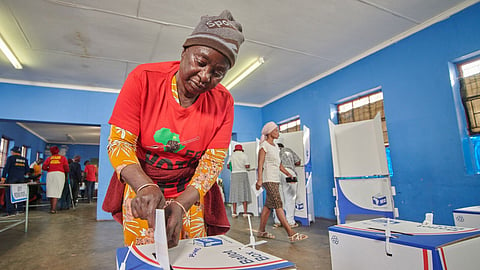ANC loses ground in early vote tally, risks losing majority for first time since Apartheid
Early election results in South Africa show the ruling African National Congress (ANC) at risk of losing its parliamentary majority for the first time since 1994, with only 42.3% of the vote. The Democratic Alliance and Economic Freedom Fighters gained 26.3% and 8.1%, respectively. Coalition scenarios and economic implications loom.
Sign up for your early morning brew of the BizNews Insider to keep you up to speed with the content that matters. The newsletter will land in your inbox at 5:30am weekdays. Register here.
By Antony Sguazzin, Rene Vollgraaff and Ana Monteiro
South Africans woke to early results showing the ruling party at risk of losing its parliamentary majority for the first time since taking power at the end of apartheid three decades ago.
With ballots from 10% of voting districts counted, the African National Congress has garnered a share of about 42.3%, matching the predictions made by some polls before the elections. The earlier tallies showed the party losing ground in Gauteng and KwaZulu-Natal, the two most-populous provinces.
A large proportion of the votes counted are from the largely rural Eastern Cape, an ANC stronghold and the birthplace of the country's first two Black presidents, Nelson Mandela and Thabo Mbeki. Results are expected to continue to flow in until the weekend.
Should the ANC be pushed below 50% for the first time since taking power in 1994, it could be forced into a coalition with its choice of partner dictated by just how far its vote share falls. A slight dip below 50% could see it form an alliance with small parties that would leave its economic policies largely intact.
A larger decline would give it the choice of either combining with the main opposition Democratic Alliance, which would be welcomed by investors, or allying with populist parties that have threatened to nationalize everything from land to banks, denting business confidence.
The rand declined as much as 0.6% against the dollar.
The ANC could also theoretically lead a minority government, but would still need the backing of other parties to pass budgets and legislation.
The DA won 26.3% of the early votes, while the populist Economic Freedom Fighters had 8.1%. uMkhonto weSizwe, or MKP, a new party headed by the country's scandal-tainted former President Jacob Zuma, won 7.6%.
MKP is expected to take votes from the ANC as Zuma has a strong following as well as the EFF, which espouses similar policies. As Zuma is a Zulu who at times campaigns on his ethnicity, it's also likely to harm the Inkatha Freedom Party, a Zulu nationalist party.
In the 2019 election the ANC won 57.5% of the vote, at the time its lowest ever share. The DA 20.8% and the EFF 10.8%.
Read also:
© 2024 Bloomberg L.P.

